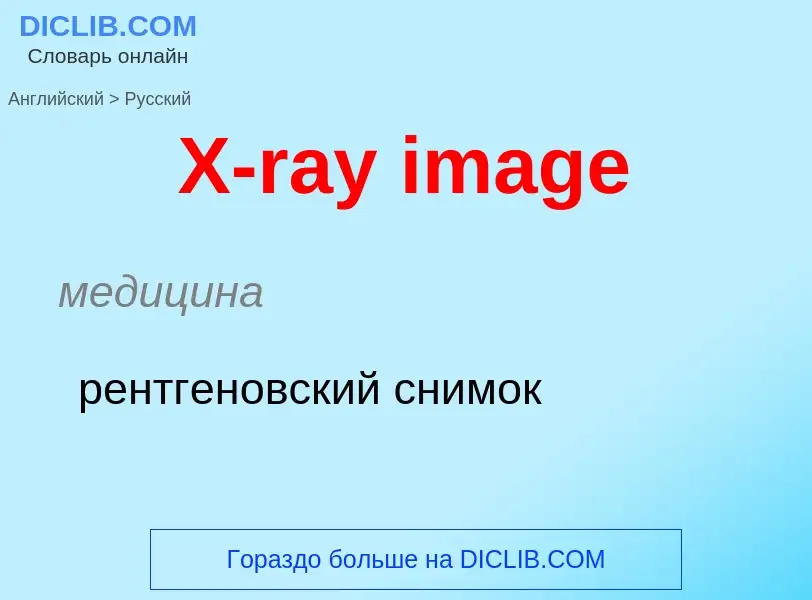Translation and analysis of words by ChatGPT artificial intelligence
On this page you can get a detailed analysis of a word or phrase, produced by the best artificial intelligence technology to date:
- how the word is used
- frequency of use
- it is used more often in oral or written speech
- word translation options
- usage examples (several phrases with translation)
- etymology
X-ray image - translation to russian
медицина
рентгеновский снимок
медицина
рентгеновское исследование
рентгенодиагностическое исследование
рентгенологическое исследование
общая лексика
рентгеноструктурный анализ
строительное дело
рентгенографический дифракционный анализ (грунта)
Definition
Wikipedia
Radiography is an imaging technique using X-rays, gamma rays, or similar ionizing radiation and non-ionizing radiation to view the internal form of an object. Applications of radiography include medical radiography ("diagnostic" and "therapeutic") and industrial radiography. Similar techniques are used in airport security (where "body scanners" generally use backscatter X-ray). To create an image in conventional radiography, a beam of X-rays is produced by an X-ray generator and is projected toward the object. A certain amount of the X-rays or other radiation is absorbed by the object, dependent on the object's density and structural composition. The X-rays that pass through the object are captured behind the object by a detector (either photographic film or a digital detector). The generation of flat two dimensional images by this technique is called projectional radiography. In computed tomography (CT scanning) an X-ray source and its associated detectors rotate around the subject which itself moves through the conical X-ray beam produced. Any given point within the subject is crossed from many directions by many different beams at different times. Information regarding attenuation of these beams is collated and subjected to computation to generate two dimensional images in three planes (axial, coronal, and sagittal) which can be further processed to produce a three dimensional image.

![AP radiograph of the [[lumbar spine]] AP radiograph of the [[lumbar spine]]](https://commons.wikimedia.org/wiki/Special:FilePath/AP lumbar xray.jpg?width=200)
![Taking an X-ray image with early [[Crookes tube]] apparatus, late 1800s Taking an X-ray image with early [[Crookes tube]] apparatus, late 1800s](https://commons.wikimedia.org/wiki/Special:FilePath/Crookes tube xray experiment.jpg?width=200)
![3D rendered]] image at upper left 3D rendered]] image at upper left](https://commons.wikimedia.org/wiki/Special:FilePath/Ct-workstation-neck.jpg?width=200)
![Ida]]. Ida]].](https://commons.wikimedia.org/wiki/Special:FilePath/Darwinius radiographs.jpg?width=200)

.jpg?width=200)
![1897 sciagraph (X-ray photograph) of ''[[Pelophylax lessonae]]'' (then ''Rana Esculenta''), from James Green & James H. Gardiner's "Sciagraphs of British Batrachians and Reptiles" 1897 sciagraph (X-ray photograph) of ''[[Pelophylax lessonae]]'' (then ''Rana Esculenta''), from James Green & James H. Gardiner's "Sciagraphs of British Batrachians and Reptiles"](https://commons.wikimedia.org/wiki/Special:FilePath/James Green & James H. Gardiner - Sciagraphs of British Batrachians and Reptiles - 1897 - Rana Esculenta.jpg?width=200)
![detector]] detector]]](https://commons.wikimedia.org/wiki/Special:FilePath/Projectional radiography components.jpg?width=200)


![tetrahedrally]] and held together by single [[covalent bond]]s, making it strong in all directions. By contrast, graphite is composed of stacked sheets. Within the sheet, the bonding is covalent and has hexagonal symmetry, but there are no covalent bonds between the sheets, making graphite easy to cleave into flakes. tetrahedrally]] and held together by single [[covalent bond]]s, making it strong in all directions. By contrast, graphite is composed of stacked sheets. Within the sheet, the bonding is covalent and has hexagonal symmetry, but there are no covalent bonds between the sheets, making graphite easy to cleave into flakes.](https://commons.wikimedia.org/wiki/Special:FilePath/Diamond and graphite2.jpg?width=200)


![backbone]] from its N-terminus to its C-terminus. backbone]] from its N-terminus to its C-terminus.](https://commons.wikimedia.org/wiki/Special:FilePath/Myoglobin.png?width=200)
![Rocknest]]", October 17, 2012).<ref name="NASA-20121030" /> Rocknest]]", October 17, 2012).<ref name="NASA-20121030" />](https://commons.wikimedia.org/wiki/Special:FilePath/PIA16217-MarsCuriosityRover-1stXRayView-20121017.jpg?width=200)
![A protein crystal seen under a [[microscope]]. Crystals used in X-ray crystallography may be smaller than a millimeter across. A protein crystal seen under a [[microscope]]. Crystals used in X-ray crystallography may be smaller than a millimeter across.](https://commons.wikimedia.org/wiki/Special:FilePath/Protein crystal.jpg?width=200)


